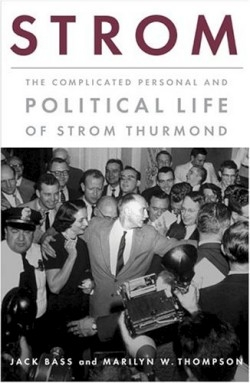Strom
The Complicated Personal and Political Life of Strom Thurmond
No other politician (except Alabama Governor George Wallace) symbolized resistance to civil rights more than Strom Thurmond. This excellent, sweeping biography is an essential update of the authors’ 1998 account, Ol’ Strom, made necessary by Essie Mae Washington-Williams’ public admission in 2004 that she was Thurmond’s bi-racial daughter. The authors skillfully weave throughout the book the life of Washington-Williams and her relationship to her father, which tempered Thurmond’s shrill attacks on civil rights by his concern for and support—if not acknowledgment—of his daughter and her children.
Thurmond was born in 1902 in Edgefield, South Carolina, a county with a long history of violence toward African-Americans. Essie Mae, his first daughter, was born in 1925. Her mother, Carrie Butler, was a sixteen-year-old domestic worker.
In 1948, Thurmond ran as the “Dixiecrat” candidate for president on a racist platform of white supremacy, thinly disguised behind a veneer of states rights politics, an ugly campaign that the authors recount well. He served in the U.S. Senate for forty-eight years, longer than anyone, from 1954 to 2003, retiring at age 100. Despite a weak legislative record, Thurmond was a master at bringing large amounts of federal aid to South Carolina, and he had an enduring influence on national politics. His Dixiecrat candidacy paved the way for the rise of the Republican Party in the South.
Thurmond condemned the 1954 Brown v Board of Education Supreme Court decision, and he set a record, which still stands, of filibustering for twenty-four hours against the weak 1957 Civil Rights Bill. However, by 1970, he recognized the growing political power of South Carolina’s African-Americans. In 1982, he supported the extension of the Voting Rights Act, and the following year he advocated legislation to make Martin Luther King’s birthday a national holiday. His funeral in 2003 was attended by thousands of South Carolinians—white and black.
Bass and Thompson are well qualified to tell Thurmond’s story. Bass has written or co-authored six books, including Taming the Storm, which received the 1994 Robert F. Kennedy Book Award. Thompson, an author and reporter who covered Thurmond in the late 1970s, is currently the editor of the Lexington, Kentucky Herald-Leader. The authors of this lucid and entertaining narrative cannot be faulted for not determining if Thurmond evolved during his life from his early racist roots, or if he merely came to support legislation beneficial to African-Americans because of their potential votes. This remains a question that probably no one—maybe not even “Ol’ Strom” himself—could answer.
Reviewed by
Karl Helicher
Disclosure: This article is not an endorsement, but a review. The publisher of this book provided free copies of the book to have their book reviewed by a professional reviewer. No fee was paid by the publisher for this review. Foreword Reviews only recommends books that we love. Foreword Magazine, Inc. is disclosing this in accordance with the Federal Trade Commission’s 16 CFR, Part 255.

